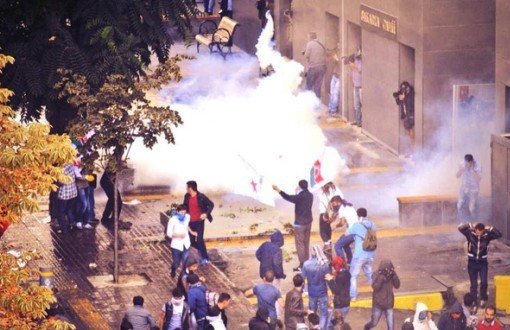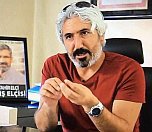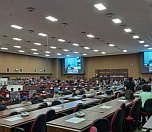Drawing: Ercan Altuntaş
Click to read the article in Turkish
The 4th session of the 28th trial period of the Kobani case took place at the Ankara 22nd High Criminal Court located in the Sincan Penitentiary Campus today (August 10).
In the trial, 108 individuals are being prosecuted, including former Co-Chairpersons of the People's Democratic Party (HDP) Figen Yüksekdağ and Selahattin Demirtaş, former Co-Chairperson of the Democratic Regions Party (DBP) Sebahat Tuncel, Honorary Chairperson of HDP Ertuğrul Kürkçü, and members of the HDP Central Executive Committee.
The indictment, comprising 3,530 pages and 324 folders, charges the 108 politicians with various crimes, including "undermining the unity and integrity of the state" and 37 counts of "murder."
"We were on duty to prevent ISIS from crossing"
The current trial began with the defense of Can Memiş, who is being tried without detention. Memiş stated the following:
"An e-mail from the Solidarity Coordination of Sinjar to Gaza was considered as evidence. It is actually insulting that this platform is made subject to accusations," told Memiş the court.
"The prosecution didn't even establish that this e-mail reached me. The fact that our names appear unknowingly in any post doesn't make us a part of that organization. The connection made between me as an HDP and HDP Central Executive Committee member at a young age and the e-mail is unclear to me," he added and continued:
"I wasn't asked where I was during the Kobani events. I was asked if I participated in the Kobani events. In the stages of the police investigation and in all other stages, I was never asked where I was. Everyone focused on whether I was present at the meeting or not. What happened on October 6-8? HDP, women's organizations, unions, and associations stood guard in Suruç. They call it a tent activity, but there was no tent activity. I, too, stood guard at the border. These were guards to prevent ISIS from crossing the border. We should see that these guards were against ISIS, not against Turkey."
"Prosecutor is trying to invent crimes"
"In the indictment, it's alleged that an Executive Committee (MYK) tweet was sent, and it was shown as if I was going to Suruç because of that. But that's not the case. Suruç is one of the rare places where Kobani demonstrations did not take place. The assertion that I organized the events just because I was in Suruç is entirely an attempt by the prosecutor to try to invent crimes."
"The actions described by the prosecutor include going to Suruç, making a phone call, and returning to Istanbul. For the prosecutor, these actions point at illegal activity. In the indictment, it's mentioned that I was 'outside until the late hours and changed locations.' This clearly signifies the end of the rule of law. What's wrong with being outside late at night? The prosecution has literally taken on a parental role. This sets a new threshold in the legal realm."
"How will young people engage in politics?"
"The prosecution has treated my involvement in HDP as an 'organizational strategy.' Having people under the age of 20 in management positions is related to the party's statute. This is the case in other parties as well. This doesn't make us guilty. If young people are going to face such accusations, how will they engage in politics?"
"Hasn't politics turned into a retirement café? If young people are going to be accused like this, no young person should be involved in any political party. I'm being tried for life imprisonment at the age of 30. How come? Is this political party legal? Yes, it's legal. Does it undergo oversight? Yes, it does. Does it participate in elections? Yes, it does. How does my involvement in that political party become a subject of accusation?"
"Prosecutor should look at HDP's policies"
"The fact that the HDP frequently references the Solution Process shows that the party is consistently in favor of a solution, and that's why I'm a member of the HDP. If the prosecution wants to understand why I'm an HDP member, they should look at the party's policies. I have never been on the side of death. That's why I joined the HDP. The HDP's policies reflect this as well."
"Nobody other than the MYK members could attend the MYK meetings. And those who attended the MYK meetings used to take the floor and express their own opinions on the agenda items," told Memiş the court.
Memiş also stated that due to the trial, he couldn't find a job, and that he was accepted to a college in the United States, but he couldn't go due to the travel ban. He requested the lifting of the travel ban.
The court rejected the requests for the removal of the judicial control measures applied to Memiş.
The next trial will be held on August 14.
What happened in the Kobani protests?
The 2014 Kobanî protests are large-scale rallies by pro-People's Defense Units (YPG) protestors in Turkey in the autumn 2014, in reaction to the siege of Kobanî launched by the ISIS. Large demonstrations unfolded in Turkey, and quickly descended into violence between protesters and the Turkish police. Before the protests, those who were waiting in the district of Suruç, Urfa in southeastern Turkey and wanted to cross the border to enter Kobani were intervened with pepper gas and rubber bullets. In the meantime, some pictures allegedly showing ISIS militia crossing the border of Turkey were published. The Suruç district of Urfa in Turkey and Kobani town in Syria are two Kurdish majority settlements on two sides of the border that are at a distance of 15 kilometers from one another. President and Chairperson of ruling Justice and Development Party (AKP) Recep Tayyip Erdoğan made statements indicating that they equated PKK with ISIS and one saying "Kobani is just about to fall". While the wounded coming from Kobani were kept waiting on the border, the wounded from ISIS were treated at hospitals. Several news reports in the press were published, reporting that "Kobani fell," refuted each time. After the People's Democratic Party (HDP) made a call to take to the streets against a possible ISIS massacre in Kobani, thousands of people protested in Kurdish-majority provinces as well as Ankara and İstanbul. While left parties also supported these protests, deaths occurred with the onset of police violence. Street conflicts ensued and 12 people were killed initially. A total of 42 people lost their lives from October 6 to 12, 2014. According to a report by the Human Rights Association (İHD), 46 people died, 682 people were wounded and 323 people were arrested in the protests held between October 6 and 8, 2014. As reported by the Anadolu Agency, 31 people lost their lives, 221 citizens and 139 police officers were wounded. |
(AS/PE)




.jpg)

.jpg)

.jpg)
.jpg)
